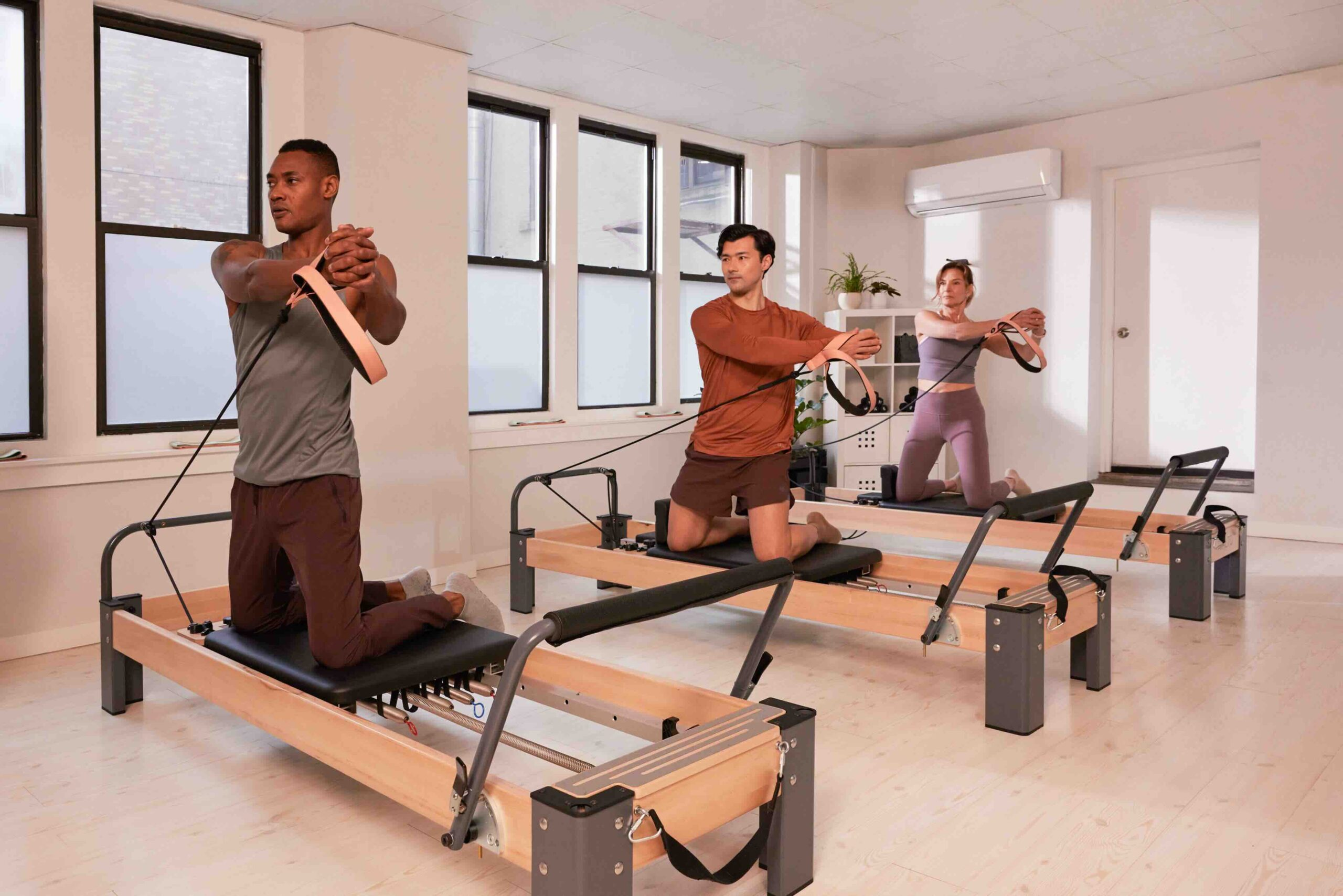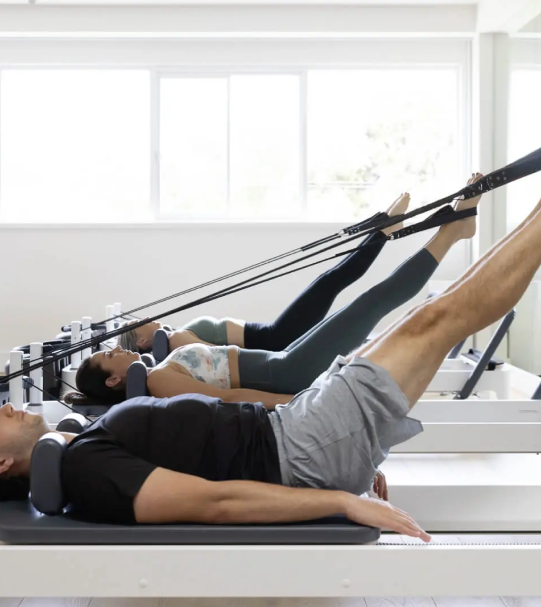

Find Your Balance at Wellbridge
True healing encompasses the restoration of both body and mind—and Wellbridge is proud to offer Pilates for substance use and co-occurring disorder recovery. Our program recognizes that recovery is a journey of self-discovery and renewal, and we believe that Pilates offers a powerful avenue for individuals to reclaim their physical and mental strength.
By combining the principles of Pilates with a holistic approach to recovery, our program at Wellbridge provides a supportive environment for those navigating the challenges of addiction. Through mindful movement, breathwork, and personalized guidance, our patients can cultivate resilience, regain balance, and foster a sense of empowerment on their path to recovery—and all within the welcoming confines of our new, 10,000-square-foot Wellness Center.
Join us as we embark on this transformative journey towards renewed vitality and well-being.
What is the Pilates Method?
Pilates is a form of exercise developed by Joseph Pilates in the early 20th century.[1] It focuses on strengthening the body’s core muscles, enhancing flexibility, improving posture, and promoting overall physical and mental well-being. Pilates exercises are typically controlled with a focus on precise movements, proper alignment, and breath awareness.
The Pilates method emphasizes the integration of mind and body, encouraging practitioners to engage their muscles with intention and mindfulness.[2] It consists of a series of exercises that can be performed on a mat or using specialized equipment such as the reformer, Cadillac, and chair. Pilates is suitable for people of all fitness levels and can be adapted to accommodate individual needs and goals.
Overall, Pilates offers a comprehensive approach to fitness and wellness, emphasizing physical strength and flexibility, mental clarity, concentration, and body awareness. It is often praised for its ability to improve posture, alleviate back pain, enhance athletic performance, and promote a sense of balance and harmony within the body.
Why is Physical Fitness Important for Addiction Recovery?
Physical fitness plays a crucial role in addiction recovery for several reasons. Firstly, engaging in regular physical activity can help alleviate the physical symptoms of withdrawal and reduce cravings for drugs or alcohol. Exercise triggers the release of endorphins, neurotransmitters in the brain that promote feelings of well-being and happiness, which can act as natural mood lifters during the challenging phases of recovery.[3]
Adopting a fitness routine can provide you with a positive outlet for stress relief and emotional regulation.[4] Many people turn to substances as a coping mechanism for stress, anxiety, or depression. By incorporating physical activity into their daily lives, they can develop healthier coping strategies and learn to manage their emotions in a constructive manner.
Physical fitness also promotes overall health and vitality, which is particularly important for those recovering from the toll that substance abuse may have taken on their bodies. Regular exercise strengthens the immune system, improves cardiovascular health, enhances sleep quality, and boosts energy levels, all of which contribute to a greater sense of well-being and resilience in recovery.[5]
In addition, participating in group fitness activities or sports can foster a sense of camaraderie and social support, both of which are essential elements of successful recovery. Building connections with others who share similar goals and interests can provide encouragement, accountability, and a sense of belonging, all of which are vital for maintaining sobriety and preventing relapse in the future.
We're ready to help you recover. Reach out now.How Can Pilates Help My Recovery?
In your recovery journey from addiction, Pilates can serve as a transformative companion, offering holistic benefits for both your body and mind:[6, 7]
- Physical restoration: Pilates exercises target core strength, flexibility, and balance, aiding in the restoration of your body’s natural alignment and functionality after the toll of substance abuse.
- Fostering a true mind-body connection: Through mindful movement and breathwork, Pilates fosters a deeper connection between your body and mind, promoting self-awareness and emotional regulation, crucial elements in overcoming addiction.
- Stress reduction: Pilates serves as a powerful stress-relief tool, triggering the release of endorphins and promoting a sense of relaxation and well-being, helping to manage cravings and reduce the risk of relapse.
- Developing a positive coping mechanism: Adopting Pilates as a regular practice provides a healthy outlet for managing stress and negative emotions, replacing destructive habits with constructive and empowering behaviors.
- Empowerment and self-esteem: As you progress in your Pilates practice, achieving new levels of strength, flexibility, and mastery can boost your self-esteem and confidence, empowering you to overcome challenges and setbacks in your recovery journey.
- Long-term wellness: Pilates offers a sustainable approach to fitness and well-being. It promotes long-term health and vitality beyond recovery and supports your ongoing commitment to a fulfilling and substance-free life.
- Body awareness: Pilates cultivates a heightened awareness of your body’s sensations, movements, and limitations, empowering you to make healthier choices and prioritize self-care in your daily life.
- Emotional resilience: Through the discipline and focus required in Pilates practice, you develop resilience and perseverance, essential qualities for navigating the ups and downs of recovery with strength and determination.
- Holistic healing: Pilates offers a holistic approach to recovery, addressing not only physical fitness but also mental and emotional well-being, creating a balanced foundation for sustainable and comprehensive healing from addiction.
Frequently Asked Questions About Pilates for SUD Recovery
Is Pilates suitable for beginners in recovery?
Yes, Pilates is highly suitable for beginners in recovery. In fact, it’s often recommended as a gentle yet effective form of exercise for those who may be easing back into physical activity or starting a fitness routine for the first time.
Pilates can be adapted to accommodate individuals of all fitness levels, ensuring that exercises are accessible and appropriate for each person’s unique needs and abilities. Certified instructors are skilled at providing modifications and variations to make the practice safe and enjoyable for beginners, offering personalized guidance and support as individuals progress on their recovery journey.
Will Pilates help improve my posture?
Absolutely. One of the key benefits of Pilates is its focus on proper alignment and body awareness, which can lead to significant improvements in posture over time. By strengthening the core muscles and promoting better alignment of the spine, Pilates helps to counteract the negative effects of poor posture often associated with prolonged sitting or sedentary lifestyles.
Through a series of controlled movements and exercises, Pilates targets the muscles that support good posture, helping individuals develop a stronger and more balanced body alignment. As a result, many practitioners experience reduced discomfort and tension in their bodies, along with a greater sense of confidence and poise in their posture.
Is Pilates a low-impact form of exercise?
Pilates is generally considered a low-impact form of exercise, making it particularly suitable for individuals in recovery who may be looking for a gentle yet effective way to improve their fitness. Unlike high-impact activities that place stress on the joints, Pilates focuses on controlled movements and proper alignment, reducing the risk of injury while still providing a challenging workout for the muscles.
Whether performed on a mat or using specialized equipment like a reformer, Pilates offers a safe and accessible exercise option for people of all ages and fitness levels. Its low-impact nature also makes it ideal for individuals with joint concerns or mobility limitations, allowing them to participate in a form of exercise that promotes strength, flexibility, and overall well-being.
Can Pilates help with stress management and cravings?
Pilates offers numerous benefits for stress management and emotional well-being, which can be particularly beneficial for individuals in recovery. Through a combination of breathwork, mindfulness techniques, and physical exercise, Pilates helps to reduce stress levels, promote relaxation, and enhance overall feelings of well-being.
The rhythmic breathing patterns and focus on mindful movement can help individuals connect with their bodies and quiet the mind, providing a welcome respite from the stresses and challenges of daily life. Additionally, the release of endorphins during exercise acts as a natural mood lifter, potentially reducing cravings for substances by promoting feelings of pleasure and satisfaction.
By incorporating Pilates into your routine, you can cultivate healthier coping mechanisms, manage stress more effectively, and better support your ongoing sobriety journey.
Sources
[1] Pilates 101: What It Is and Its Health Benefits. (2023, March 10). Cleveland Clinic. https://health.clevelandclinic.org/everything-you-want-to-know-about-pilates on May 7, 2024
[2] Kloubec, J. (2011). Pilates: how does it work and who needs it? Muscles, Ligaments and Tendons Journal, 1(2), 61–66. https://www.ncbi.nlm.nih.gov/pmc/articles/PMC3666467/ on May 7, 2024
[3] Linke, S. E., & Ussher, M. (2014). Exercise-based treatments for substance use disorders: evidence, theory, and practicality. The American Journal of Drug and Alcohol Abuse, 41(1), 7–15. https://doi.org/10.3109/00952990.2014.976708 on May 7, 2024
[4] More, A., Jackson, B., Dimmock, J. A., Thornton, A. L., Colthart, A., & Furzer, B. J. (2017). Exercise in the Treatment of Youth Substance Use Disorders: Review and Recommendations. Frontiers in Psychology, 8. https://doi.org/10.3389/fpsyg.2017.01839 on May 7, 2024
[5] Nieman, D. C., & Wentz, L. M. (2019). The compelling link between physical activity and the body’s defense system. Journal of Sport and Health Science, 8(3), 201–217. https://doi.org/10.1016/j.jshs.2018.09.009 on May 7, 2024
[6] Moon, N.-R., & Yang, W.-H. (2022). Effects of individualized low-intensity mat Pilates on aerobic capacity and recovery ability in adults. Physical Activity and Nutrition, 26(4), 046–053. https://doi.org/10.20463/pan.2022.0024 on May 7, 2024
[7] Wang, D., Wang, Y., Wang, Y., Li, R., & Zhou, C. (2014). Impact of Physical Exercise on Substance Use Disorders: A Meta-Analysis. PLoS ONE, 9(10), e110728. https://doi.org/10.1371/journal.pone.0110728 on May 7, 2024
Find Holistic Care for Substance Abuse at Wellbridge
When you’re ready to prioritize your well-being and embrace a path to renewal, Wellbridge invites you to partner with us on your recovery. We understand that recovery is a personal journey, and we’re committed to meeting you where you are.
Your journey to recovery and wellness is unique, and Wellbridge is here to honor and support that uniqueness. Whenever you’re ready, we’ll be here to welcome you with open arms.